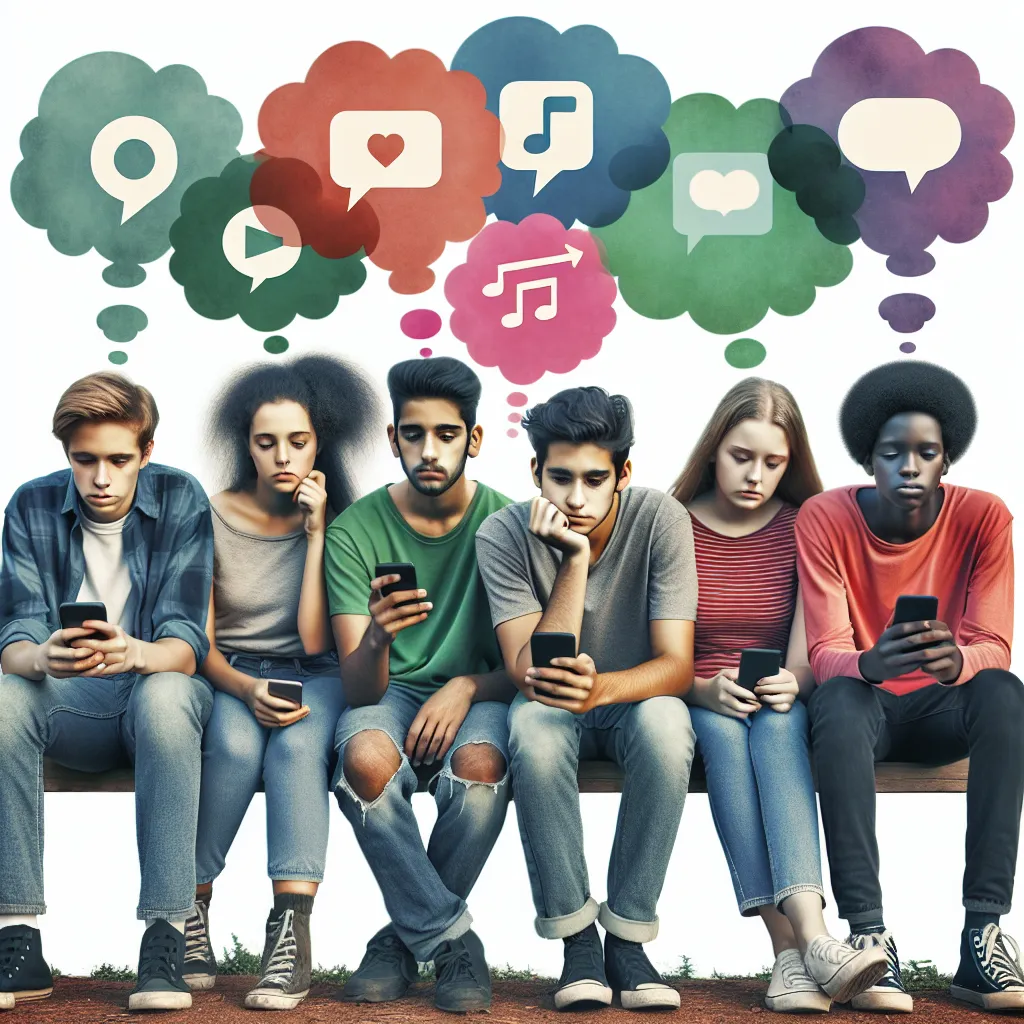Social media’s influence on teenage self-esteem has become a prevalent topic in recent IELTS Writing Task 2 exams. This theme reflects growing concerns about digital technology’s effects on youth mental health. Based on past exam trends and current societal issues, we can expect this topic to appear frequently in future tests. Let’s explore a relevant question and provide sample essays to help you prepare effectively.
Nội dung bài viết
Analyzing the Question
Some people believe that social media has a negative impact on the self-esteem of teenagers. To what extent do you agree or disagree with this statement?
This question asks for your opinion on whether social media negatively affects teenage self-esteem. It’s crucial to:
- Clearly state your position
- Provide specific examples and explanations
- Consider potential counterarguments
- Conclude with a well-supported stance
Let’s examine three sample essays of varying quality to understand the expectations for different band scores.
 Teenagers using social media on smartphones
Teenagers using social media on smartphones
Sample Essay 1: Band 8-9 Level
In the digital age, social media has become an integral part of teenagers’ lives, leading to widespread concerns about its impact on their self-esteem. While I acknowledge that social media can have positive effects, I largely agree that it often negatively influences adolescents’ self-perception and confidence.
Social media platforms can significantly undermine teenage self-esteem in several ways. Firstly, the constant exposure to carefully curated, idealised images of peers and celebrities can lead to unrealistic comparisons. Teenagers may feel inadequate when their own lives don’t measure up to the seemingly perfect experiences portrayed online. For instance, a study by the Royal Society for Public Health found that Instagram, a photo-sharing platform, was rated as the worst social media app for youth mental health, often triggering feelings of anxiety, depression, and poor body image.
Moreover, the quantification of popularity through likes, followers, and comments can create a toxic environment where self-worth becomes tied to digital validation. This ‘metrics of self-esteem’ can be particularly damaging during the formative teenage years when identity and self-concept are still developing. The pressure to maintain an online persona and the fear of missing out (FOMO) can lead to increased stress and lowered self-confidence.
However, it’s important to recognize that social media isn’t inherently negative. When used mindfully, these platforms can provide opportunities for self-expression, community building, and learning. Some teenagers find empowerment through connecting with like-minded peers or accessing information that helps them understand and accept themselves better. For example, LGBTQ+ youth may find supportive online communities that boost their self-esteem in ways not available in their immediate physical environment.
To mitigate the negative impacts, a multi-faceted approach is necessary. Education about responsible social media use, critical thinking skills to navigate online information, and promoting offline activities and relationships are crucial. Parents and educators play a vital role in helping teenagers develop a healthy relationship with social media and fostering self-esteem based on intrinsic values rather than digital metrics.
In conclusion, while social media can offer some benefits, its overall impact on teenage self-esteem tends to be more negative than positive. The pervasive nature of these platforms in adolescents’ lives makes it crucial to address this issue proactively. By implementing strategies to counteract the harmful effects and promoting healthier digital habits, we can help teenagers navigate the complex world of social media while maintaining a strong sense of self-worth.
(Word count: 395)
Analysis of Band 8-9 Essay
This essay demonstrates excellent writing skills and meets the criteria for a high band score:
- Task Response: The essay clearly addresses all parts of the task, presenting a well-developed argument with relevant examples.
- Coherence and Cohesion: Ideas flow logically with clear progression. Paragraphs are well-linked, and cohesive devices are used effectively.
- Lexical Resource: A wide range of vocabulary is used accurately and appropriately. Collocations like “carefully curated” and “digital validation” show sophistication.
- Grammatical Range and Accuracy: Complex sentence structures are used confidently with a high degree of accuracy. Various grammatical forms are employed.
Sample Essay 2: Band 6-7 Level
Social media has become very popular among teenagers, and many people think it negatively affects their self-esteem. I mostly agree with this idea because social media can cause problems for young people’s confidence.
One main reason why social media can harm teenage self-esteem is because of comparisons. When teenagers see pictures of their friends or celebrities looking perfect online, they might feel bad about themselves. For example, if someone sees their classmates posting about fun parties or vacations, they might think their own life is boring. This can make them feel less confident.
Another problem is cyberbullying. Some people use social media to say mean things to others, which can really hurt a teenager’s feelings and self-esteem. They might get negative comments about their appearance or personality, and this can be very damaging, especially for young people who are still figuring out who they are.
However, social media isn’t all bad for self-esteem. Sometimes it can help teenagers feel more confident. They can share their talents or interests and get positive feedback. For instance, a teenager who likes art can post their drawings and get encouragement from others. This can make them feel good about themselves.
To help with this problem, I think parents and schools should teach teenagers how to use social media in a healthy way. They should learn not to compare themselves too much to others and to remember that what they see online isn’t always real. It’s also important for teenagers to spend time doing things offline and not just focus on social media.
In conclusion, while social media can sometimes be good for self-esteem, I believe it often has a negative effect on teenagers. It’s important to be aware of these risks and find ways to use social media that don’t harm self-confidence.
(Word count: 309)
Analysis of Band 6-7 Essay
This essay shows good writing skills but has some limitations:
- Task Response: The main ideas are relevant, but the development is less comprehensive than the Band 8-9 essay.
- Coherence and Cohesion: The essay is generally coherent, but the linking between ideas could be more sophisticated.
- Lexical Resource: The vocabulary is appropriate but less varied. Some attempts at more advanced language are present.
- Grammatical Range and Accuracy: Sentence structures are generally accurate but less complex. There’s a mix of simple and compound sentences.
Sample Essay 3: Band 5-6 Level
Social media is very popular now days. Many teenagers use it all the time. Some people think it is bad for teenager’s self-esteem. I agree with this idea.
First, social media make teenagers feel bad about themself. They see many beautiful pictures of other people. This make them think they are not good enough. For example, if a girl see her friend looking very pretty in photo, she may think she is ugly. This is not good for her confidense.
Also, social media have cyberbullying. Bad people say mean things to teenagers online. This hurt their feelings very much. It can make them very sad and not like themself.
But social media is not always bad. Sometimes it help teenagers feel good. They can show their hobby and get likes. This can make them happy.
I think it’s important to teach teenagers how to use social media good. They should know it’s not real life. They should also do other things, not only use social media.
In conclusion, I think social media is mostly bad for teenager’s self-esteem. We need to be careful about how teenagers use it.
(Word count: 178)
Analysis of Band 5-6 Essay
This essay demonstrates basic writing skills with several limitations:
- Task Response: The essay addresses the main points but lacks depth and detail.
- Coherence and Cohesion: Basic organization is present, but paragraphs are short and underdeveloped.
- Lexical Resource: Vocabulary is limited and repetitive. Some spelling errors are present (e.g., “confidense”).
- Grammatical Range and Accuracy: Simple sentence structures dominate, with frequent grammatical errors (e.g., subject-verb agreement, plural forms).
Key Vocabulary to Remember
- Self-esteem (noun) /ˌselfɪˈstiːm/ – confidence in one’s own worth or abilities
- Curated (adjective) /ˈkjʊəreɪtɪd/ – carefully chosen and presented
- Inadequate (adjective) /ɪnˈædɪkwət/ – not good enough; insufficient
- Validation (noun) /ˌvælɪˈdeɪʃn/ – recognition or affirmation that a person or their feelings are valid
- Persona (noun) /pəˈsəʊnə/ – the aspect of someone’s character that is presented to or perceived by others
- Empowerment (noun) /ɪmˈpaʊəmənt/ – the process of becoming stronger and more confident
- Intrinsic (adjective) /ɪnˈtrɪnsɪk/ – belonging naturally; essential
- Proactively (adverb) /prəʊˈæktɪvli/ – in a way that creates or controls a situation rather than just responding to it
- Cyberbullying (noun) /ˈsaɪbəˌbʊliɪŋ/ – the use of electronic communication to bully a person
- Mitigate (verb) /ˈmɪtɪɡeɪt/ – make less severe, serious, or painful
Conclusion
The impact of social media on teenage self-esteem is a crucial topic in IELTS Writing Task 2. By studying these sample essays and understanding the criteria for different band scores, you can improve your writing skills and prepare effectively for the exam. Remember to practice writing your own essays on this topic and related themes, such as:
- The effects of digital technology on mental health
- The role of social media in shaping youth culture
- Strategies for promoting positive self-image in the digital age
We encourage you to write your own essay on this topic and share it in the comments section below. This practice will help you refine your skills and receive feedback from others, enhancing your preparation for the IELTS Writing Task 2.


